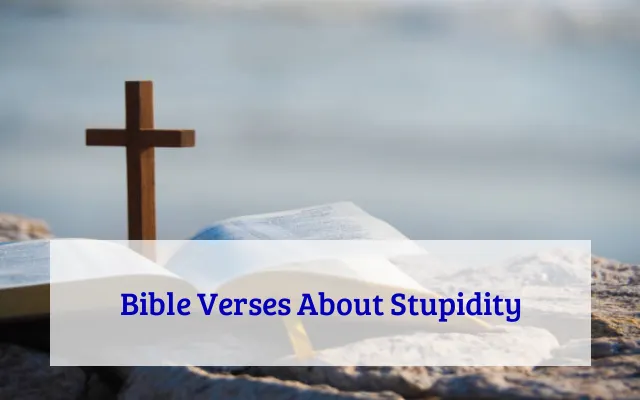Looking for insight on ‘Bible Verses About Stupidity?’ You’re in the right place. Today’s content is tailored for those seeking to understand the Bible’s perspective on foolishness and lack of wisdom. Here, we’ll explore Bible verses that shed light on the nature and consequences of stupidity. These scriptures will help you better grasp the importance of wisdom and discernment, as presented in the Bible. Let’s see what the Word says about foolishness and its pitfalls.
Contents
- 1 What Does the Bible Say About Foolishness and Lack of Wisdom?
- 1.1 Proverbs 1:7 – Fear of the Lord is wisdom’s beginning
- 1.2 Ecclesiastes 10:2 – Heart of the wise versus foolish inclinations
- 1.3 Proverbs 18:2 – Fool delights in airing opinions, ignores understanding
- 1.4 Proverbs 14:16 – Wise avoid danger; fools are reckless and overconfident
- 1.5 Proverbs 28:26 – Trusting self is foolish; seek wisdom for guidance
- 2 Bible Verses About Fools and Their Characteristics
- 2.1 Proverbs 12:15 – Fools trust themselves; the wise seek counsel
- 2.2 Proverbs 15:5 – Rejecting correction is foolish; heeding it shows wisdom
- 2.3 Ecclesiastes 7:9 – Avoid quick anger; it’s foolishness
- 2.4 Proverbs 18:7 – A fool’s words lead to self-destruction
- 2.5 Proverbs 26:11 – Fools repeat their folly like dogs return to vomit
- 2.6 Proverbs 14:3 – Fool’s pride leads to punishment, wise speak thoughtfully
- 3 Proverbs About Stupidity and Ignorance
- 3.1 Proverbs 13:16 – Wise act with knowledge, fools display folly
- 3.2 Proverbs 10:23 – Fools find pleasure in wickedness
- 3.3 Proverbs 19:3 – Foolishness leads to ruin, then blame God
- 3.4 Proverbs 14:18 – Foolish inherit folly; prudent crowned with knowledge
- 3.5 Proverbs 17:28 – Silence can prevent one from appearing foolish
- 4 How Does Scripture Define a Foolish Person?
- 4.1 Proverbs 1:22 – Fools despise wisdom and delight in mockery
- 4.2 Proverbs 10:14 – Wise store knowledge, fools invite ruin
- 4.3 Ecclesiastes 5:1 – Approach God with reverence, not foolishness
- 4.4 Proverbs 9:13 – Loud, ignorant, and knows nothing
- 4.5 Proverbs 29:11 – Fools vent anger; the wise quietly hold back
- 4.6 Proverbs 17:24 – Wisdom focuses; fools wander without direction
- 5 Biblical Warnings Against Acting Without Wisdom
- 5.1 Proverbs 19:2 – Haste leads to mistakes and poor decisions
- 5.2 James 1:5 – Ask God for wisdom; He gives generously
- 5.3 Proverbs 21:5 – Diligence leads to abundance, haste leads to poverty
- 5.4 Ecclesiastes 10:10 – Wisdom sharpens, preventing unnecessary effort
- 5.5 Proverbs 4:7 – Wisdom is supreme; acquire and cherish understanding
- 6 Old Testament Verses About the Consequences of Foolishness
- 6.1 Proverbs 29:9 – Arguing with a fool leads to unrest and noise
- 6.2 Ecclesiastes 4:5 – Foolishness leads to self-destruction and ruin
- 6.3 Proverbs 26:6 – Trusting a fool harms the messenger
- 6.4 Ecclesiastes 10:12 – Wise words bring favor, foolish lips consume
- 6.5 Proverbs 6:32 – Adultery shows a lack of sense and wisdom
- 7 New Testament Teachings on Wisdom vs Foolishness
- 7.1 Ephesians 5:15 – Walk wisely, not as unwise, making the most
- 7.2 Matthew 7:26 – Foolishness builds on unstable foundations
- 7.3 1 Corinthians 3:18 – Embrace wisdom, avoid self-deception of false wisdom
- 7.4 James 3:13 – Wisdom shows through good conduct and humility
- 7.5 Matthew 25:2 – Five wise, five foolish; wisdom versus foolishness highlighted
- 7.6 1 Corinthians 1:25 – God’s wisdom surpasses human wisdom and folly
- 8 What the Bible Says About Pride and Arrogance Leading to Stupidity
- 8.1 Proverbs 16:18 – Pride precedes destruction, arrogance leads to downfall
- 8.2 Proverbs 11:2 – Pride leads to disgrace; wisdom comes with humility
- 8.3 Isaiah 5:21 – Woe to the self-wise and prideful
- 8.4 James 4:6 – God opposes the proud but gives grace to humble
- 8.5 Proverbs 26:12 – Self-conceit surpasses hope for a fool
- 8.6 Proverbs 27:1 – Do not boast about tomorrow’s certainty
- 8.7 1 Corinthians 10:12 – Beware pride, it precedes a fall
What Does the Bible Say About Foolishness and Lack of Wisdom?
We all have moments where we make decisions without fully thinking them through. The Bible offers guidance on how to navigate these times of foolishness, encouraging us to seek wisdom and understanding. It’s like having a wise friend who gently steers us back on track when we wander off the path. Let’s explore what the scriptures have to say on this topic.
Proverbs 1:7 – Fear of the Lord is wisdom’s beginning
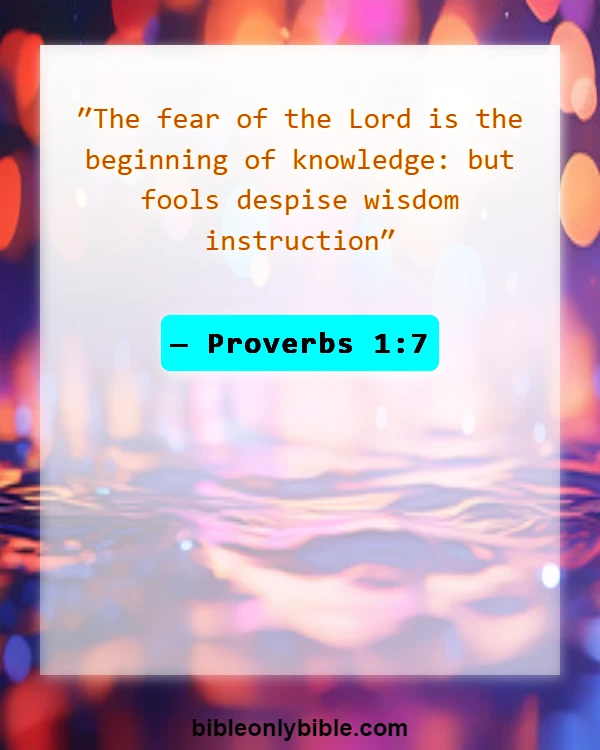
The fear of the Lord is the beginning of knowledge: but fools despise wisdom instruction
Proverbs 1:7
Explanation:- This verse highlights that true wisdom begins with reverence for God. It contrasts wisdom with foolishness, suggesting that ignoring divine guidance leads to a lack of understanding. Embracing a respectful relationship with God is key to gaining insight and avoiding foolishness.
Ecclesiastes 10:2 – Heart of the wise versus foolish inclinations
A wise man’s heart is at his right hand; but a fool’s heart at his left
Ecclesiastes 10:2
Explanation:- This verse contrasts the wise and foolish by highlighting their respective inclinations. A wise person is guided by a discerning heart, leading to sound decisions, while a fool is swayed by poor judgment, resulting in misguided actions. It underscores the importance of cultivating wisdom.
Proverbs 18:2 – Fool delights in airing opinions, ignores understanding
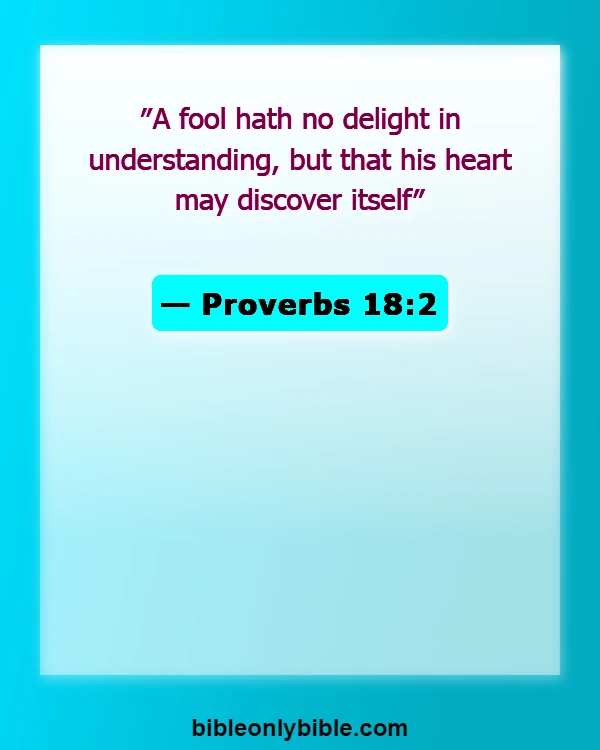
A fool hath no delight in understanding, but that his heart may discover itself
Proverbs 18:2
Explanation:- This verse highlights the behavior of fools who prioritize expressing their own opinions over seeking true understanding. It warns against the emptiness of valuing personal viewpoints more than wisdom, emphasizing the importance of humility and the pursuit of knowledge.
Proverbs 14:16 – Wise avoid danger; fools are reckless and overconfident

A wise man feareth, departeth from evil: but the fool rageth, is confident
Proverbs 14:16
Explanation:- This verse highlights the contrast between wisdom and foolishness. Wise individuals recognize potential dangers and act cautiously, while fools are reckless and overly confident, ignoring risks. It underscores the importance of discernment and humility in decision-making to avoid harmful consequences.
Proverbs 28:26 – Trusting self is foolish; seek wisdom for guidance

He that trusteth in his own heart is a fool: but whoso walketh wisely, he shall be delivered
Proverbs 28:26
Explanation:- Relying solely on one’s own understanding is considered foolish in Proverbs. Wisdom comes from seeking guidance beyond oneself, particularly from God. By trusting in divine wisdom rather than self-reliance, one can avoid the pitfalls of foolishness and make wiser decisions.
Bible Verses About Fools and Their Characteristics
We all know someone who seems to repeatedly make poor choices, maybe even ourselves at times. The Bible paints a picture of what foolishness looks like in practice, serving as a mirror to help us reflect on our own lives. Recognizing these traits can guide us to seek change and growth in our daily walk.
Proverbs 12:15 – Fools trust themselves; the wise seek counsel

The way of a fool is right in his own eyes: but he that hearkeneth unto counsel is wise
Proverbs 12:15
Explanation:- This verse highlights the contrast between foolishness and wisdom. Fools rely solely on their own understanding, often leading to poor decisions, while the wise actively seek advice and guidance from others, recognizing the value of diverse perspectives and informed counsel.
Proverbs 15:5 – Rejecting correction is foolish; heeding it shows wisdom
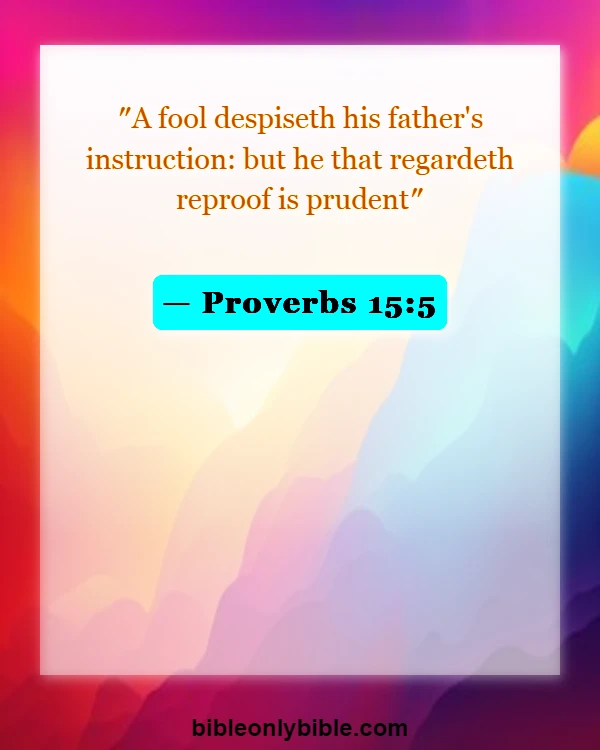
A fool despiseth his father’s instruction: but he that regardeth reproof is prudent
Proverbs 15:5
Explanation:- Rejecting correction is a sign of foolishness, highlighting a lack of openness to growth and learning. In contrast, embracing correction demonstrates wisdom, as it shows a willingness to improve and gain understanding. This underscores the value of humility and teachability.
Ecclesiastes 7:9 – Avoid quick anger; it’s foolishness

Be not hasty in thy spirit to be angry: for anger resteth in the bosom of fools
Ecclesiastes 7:9
Explanation:- This verse highlights the folly of quick anger, urging individuals to exercise patience and self-control. Reacting impulsively often leads to poor decisions and conflicts. Cultivating calmness and understanding is wise, while hasty anger aligns with foolish behavior, which should be avoided.
Proverbs 18:7 – A fool’s words lead to self-destruction
A fool’s mouth is his destruction, his lips are the snare of his soul
Proverbs 18:7
Explanation:- This verse highlights how a fool’s careless words can lead to his own downfall. It serves as a warning about the destructive power of speech, urging us to choose our words wisely to avoid self-inflicted harm and to live with wisdom and discernment.
Proverbs 26:11 – Fools repeat their folly like dogs return to vomit
As a dog returneth to his vomit, so a fool returneth to his folly
Proverbs 26:11
Explanation:- This verse vividly illustrates how fools are prone to repeating their mistakes without learning from them. Just as a dog returns to its vomit, a fool revisits their folly. It serves as a cautionary reminder to recognize and break free from destructive patterns.
Proverbs 14:3 – Fool’s pride leads to punishment, wise speak thoughtfully
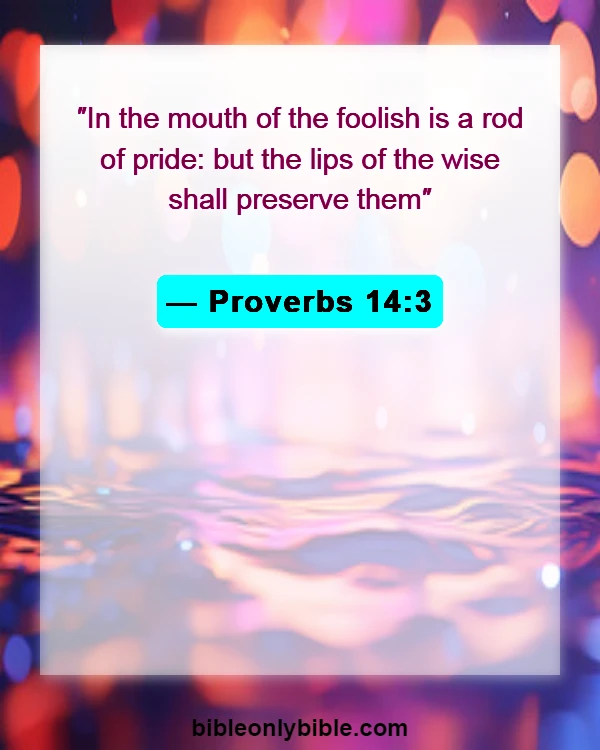
In the mouth of the foolish is a rod of pride: but the lips of the wise shall preserve them
Proverbs 14:3
Explanation:- This verse highlights the contrast between fools and the wise. Fools are marked by arrogant speech, which ultimately leads to their downfall, while the wise choose their words carefully, reflecting thoughtful understanding and bringing about positive outcomes.
Proverbs About Stupidity and Ignorance
The book of Proverbs is filled with nuggets of wisdom that highlight the pitfalls of stupidity and ignorance. These verses serve as a wake-up call, reminding us of the value of seeking knowledge and understanding. They encourage us to be lifelong learners, open to growth and change.
Proverbs 13:16 – Wise act with knowledge, fools display folly
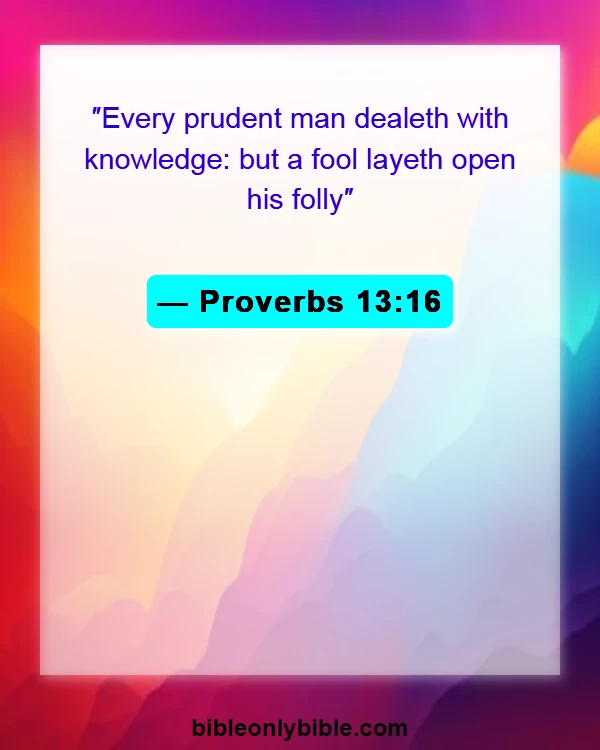
Every prudent man dealeth with knowledge: but a fool layeth open his folly
Proverbs 13:16
Explanation:- This verse highlights the contrast between wisdom and folly. It teaches that wise individuals make informed decisions, using knowledge to guide their actions. In contrast, foolish people reveal their ignorance through careless and thoughtless behavior, showcasing their lack of understanding and foresight.
Proverbs 10:23 – Fools find pleasure in wickedness
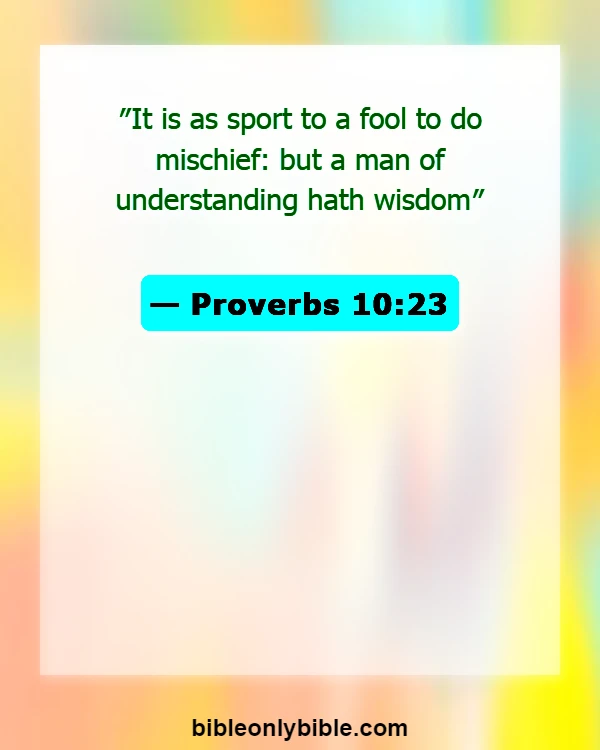
It is as sport to a fool to do mischief: but a man of understanding hath wisdom
Proverbs 10:23
Explanation:- This proverb highlights how fools take delight in engaging in wrongdoing, finding joy in acts that are morally wrong or harmful. In contrast, those with understanding find satisfaction in wisdom and righteousness, emphasizing the importance of choosing actions that align with integrity and insight.
Proverbs 19:3 – Foolishness leads to ruin, then blame God

The foolishness of man perverteth his way: his heart fretteth against the Lord
Proverbs 19:3
Explanation:- This proverb highlights how foolish behavior can lead to personal ruin, yet individuals often deflect responsibility by blaming God. It serves as a caution against ignorance and encourages personal accountability for actions and their consequences.
Proverbs 14:18 – Foolish inherit folly; prudent crowned with knowledge
The simple inherit folly: but the prudent are crowned with knowledge
Proverbs 14:18
Explanation:- This verse contrasts the outcomes of foolishness and wisdom. It highlights that those lacking wisdom naturally gravitate towards folly, leading to poor decisions and consequences. In contrast, those who are prudent and thoughtful gain valuable insights and understanding, enriching their lives with knowledge.
Proverbs 17:28 – Silence can prevent one from appearing foolish
Even a fool, when he holdeth his peace, is counted wise: he that shutteth his lips is esteemed a man of understanding
Proverbs 17:28
Explanation:- This proverb highlights the wisdom in remaining silent to avoid appearing foolish. Even a person lacking knowledge can seem wise if they choose not to speak. It underscores the value of thoughtful silence and the perception of wisdom through restraint in speech.
How Does Scripture Define a Foolish Person?
Scripture provides clear markers for identifying foolish behavior, offering us a roadmap to avoid these pitfalls. By understanding how the Bible defines foolishness, we can better align our lives with wisdom and discernment. It’s a journey of transformation, moving from folly to enlightenment.
Proverbs 1:22 – Fools despise wisdom and delight in mockery

How long, ye simple ones, will ye love simplicity? the scorners delight in their scorning, fools hate knowledge?
Proverbs 1:22
Explanation:- This verse highlights how foolish individuals reject wisdom and find pleasure in mocking others. It serves as a warning against ignoring guidance and valuing superficial entertainment over meaningful understanding, urging readers to embrace wisdom and self-reflection for personal growth and maturity.
Proverbs 10:14 – Wise store knowledge, fools invite ruin
Wise men lay up knowledge: but the mouth of the foolish is near destruction
Proverbs 10:14
Explanation:- This verse highlights the contrast between wisdom and foolishness. It teaches that wise individuals value and accumulate knowledge, using it to guide their actions. In contrast, foolish people disregard wisdom, leading to their downfall. Emphasizing the importance of discernment and prudent decision-making.
Ecclesiastes 5:1 – Approach God with reverence, not foolishness
Keep thy foot when thou goest to the house of God, be more ready to hear, than to give the sacrifice of fools: for they consider not that they do evil
Ecclesiastes 5:1
Explanation:- Approaching God requires reverence and wisdom, not carelessness. The verse cautions against foolish behavior, urging mindfulness in worship. By thoughtfully considering our steps and words, we honor God and avoid the folly of rash actions or empty rituals.
Proverbs 9:13 – Loud, ignorant, and knows nothing
A foolish woman is clamorous: she is simple, knoweth nothing
Proverbs 9:13
Explanation:- This verse highlights the characteristics of a foolish person as loud, ignorant, and lacking understanding. It serves as a warning against being impulsive and uninformed, encouraging us to seek wisdom and discernment to avoid the pitfalls of foolishness.
Proverbs 29:11 – Fools vent anger; the wise quietly hold back

A fool uttereth all his mind: but a wise man keepeth it in till afterwards
Proverbs 29:11
Explanation:- This verse highlights the contrast between foolishness and wisdom. A foolish person impulsively expresses anger, while a wise individual exercises self-control and restraint. It teaches the importance of managing emotions and suggests that wisdom is demonstrated through thoughtful and measured responses.
Proverbs 17:24 – Wisdom focuses; fools wander without direction
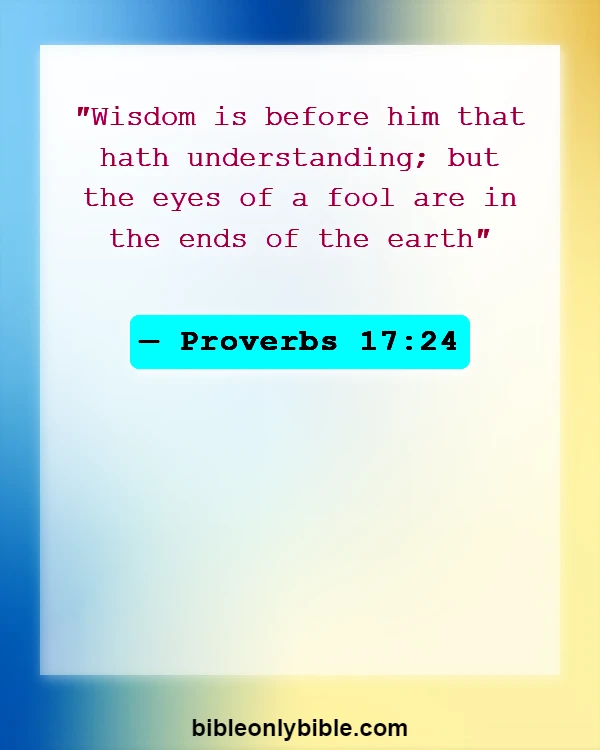
Wisdom is before him that hath understanding; but the eyes of a fool are in the ends of the earth
Proverbs 17:24
Explanation:- This verse highlights the contrast between wisdom and folly. A wise person concentrates on understanding and discernment, keeping their goals and values clear. In contrast, a foolish person lacks focus, allowing distractions to lead them astray, wandering aimlessly without purpose.
Biblical Warnings Against Acting Without Wisdom
Acting without wisdom often leads to avoidable mistakes and regrets. The Bible offers timeless warnings against such actions, urging us to pause and seek guidance before making decisions. These teachings remind us of the importance of patience and reflection in our daily choices.
Proverbs 19:2 – Haste leads to mistakes and poor decisions

Also, that the soul be without knowledge, it is not good; he that hasteth with his feet sinneth
Proverbs 19:2
Explanation:- This verse highlights the dangers of acting impulsively without knowledge. It warns that rushing into decisions without understanding can lead to poor outcomes and mistakes. Taking time to seek wisdom and understanding is crucial to making sound decisions and avoiding folly.
James 1:5 – Ask God for wisdom; He gives generously
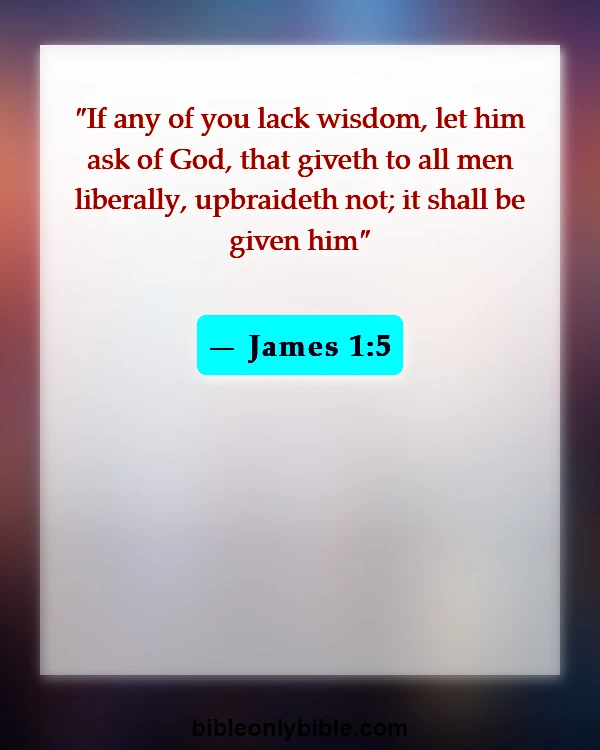
If any of you lack wisdom, let him ask of God, that giveth to all men liberally, upbraideth not; it shall be given him
James 1:5
Explanation:- This verse encourages believers to seek wisdom from God, trusting that He provides generously without criticism. It highlights the importance of relying on divine guidance rather than acting impulsively, underscoring the biblical caution against making decisions without wisdom.
Proverbs 21:5 – Diligence leads to abundance, haste leads to poverty

The thoughts of the diligent tend only to plenteousness; but of every one that is hasty only to want
Proverbs 21:5
Explanation:- This verse highlights the importance of careful planning and thoughtful action. It contrasts the prosperity that comes from diligence and patience with the pitfalls of rash decisions and impulsive behavior. Acting wisely and deliberately ensures success, while haste often results in failure and lack.
Ecclesiastes 10:10 – Wisdom sharpens, preventing unnecessary effort

If the iron be blunt, he do not whet the edge, then must he put to more strength: but wisdom is profitable to direct
Ecclesiastes 10:10
Explanation:- This verse highlights the importance of wisdom in our actions, illustrating that thoughtful preparation and insight can prevent wasted effort and inefficiency. Acting without wisdom is like using a dull tool—it requires more work and yields less effective results.
Proverbs 4:7 – Wisdom is supreme; acquire and cherish understanding
Wisdom is the principal thing; therefore get wisdom: with all thy getting get understanding
Proverbs 4:7
Explanation:- This verse emphasizes the importance of prioritizing wisdom and understanding in life. It warns against acting foolishly without guidance, highlighting that true success and fulfillment come from seeking and valuing insight and discernment above all else.
Old Testament Verses About the Consequences of Foolishness
The Old Testament is rich with stories and verses that illustrate the consequences of foolish actions. These passages serve as lessons from the past, urging us to learn from the mistakes of others. By heeding these warnings, we can cultivate a life of wisdom and purpose.
Proverbs 29:9 – Arguing with a fool leads to unrest and noise

If a wise man contendeth with a foolish man, whether he rage or laugh, there is no rest
Proverbs 29:9
Explanation:- This verse highlights the futility of engaging in disputes with foolish individuals. Such arguments often result in chaos and frustration, as fools lack the wisdom to engage constructively. It’s a reminder to choose our battles wisely and seek peace over pointless conflict.
Ecclesiastes 4:5 – Foolishness leads to self-destruction and ruin
The fool foldeth his hands together, eateth his own flesh
Ecclesiastes 4:5
Explanation:- This verse highlights the destructive nature of foolishness, illustrating how laziness and folly lead to self-harm. By folding one’s hands in idleness, a fool invites ruin, underscoring the importance of wisdom and diligent work to avoid self-destruction and achieve a fulfilling life.
Proverbs 26:6 – Trusting a fool harms the messenger
He that sendeth a message by the hand of a fool cutteth off the feet, drinketh damage
Proverbs 26:6
Explanation:- Trusting a fool leads to negative outcomes, as they are likely to mismanage messages or tasks. This verse highlights the consequences of relying on someone lacking wisdom, underscoring the importance of choosing trustworthy individuals to convey important matters.
Ecclesiastes 10:12 – Wise words bring favor, foolish lips consume
The words of a wise man’s mouth are gracious; but the lips of a fool will swallow up himself
Ecclesiastes 10:12
Explanation:- This verse highlights the power of words, contrasting the benefits of wisdom with the self-destructive nature of foolishness. Wise speech earns respect and goodwill, while foolish talk leads to negative consequences, emphasizing the importance of thoughtful communication in daily life.
Proverbs 6:32 – Adultery shows a lack of sense and wisdom
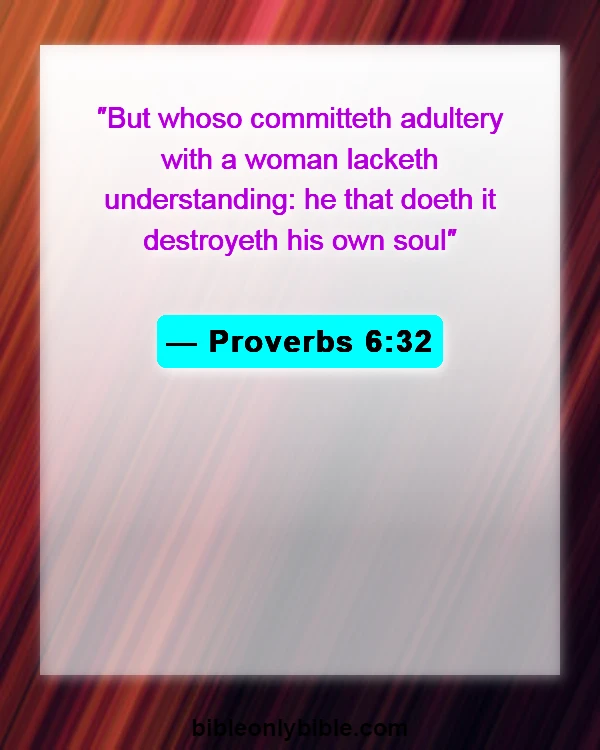
But whoso committeth adultery with a woman lacketh understanding: he that doeth it destroyeth his own soul
Proverbs 6:32
Explanation:- Adultery is highlighted as a profound lack of wisdom and understanding. It illustrates how foolish actions can lead to personal harm and moral downfall, reminding us of the serious consequences of such choices and the importance of adhering to principles of integrity and fidelity.
New Testament Teachings on Wisdom vs Foolishness
The New Testament continues the conversation on wisdom and foolishness, offering practical advice for living a life aligned with Christ’s teachings. These verses encourage us to choose wisdom over folly, leading to a more fulfilling and meaningful life. They remind us of the eternal value of wise living.
Ephesians 5:15 – Walk wisely, not as unwise, making the most
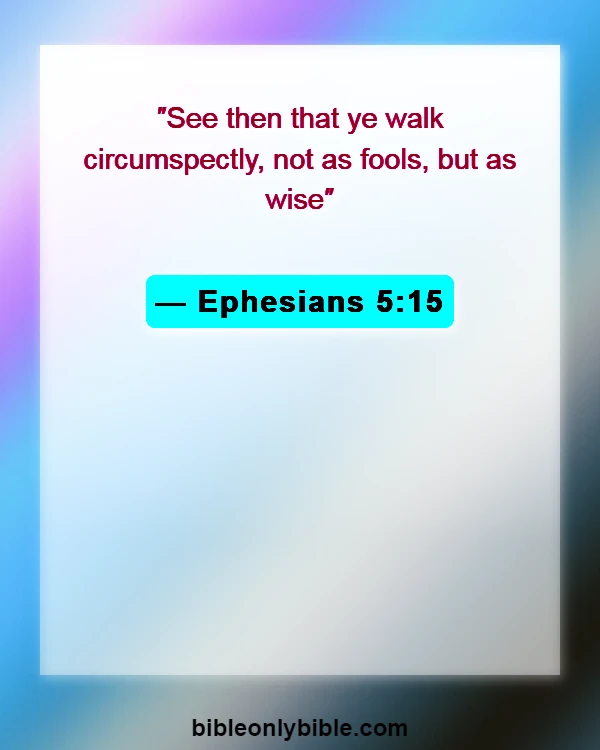
See then that ye walk circumspectly, not as fools, but as wise
Ephesians 5:15
Explanation:- This verse encourages believers to live thoughtfully and wisely, avoiding foolishness. It highlights the importance of making the most of every opportunity, aligning one’s actions with wisdom. By walking wisely, individuals can navigate life effectively, reflecting maturity and discernment in their choices.
Matthew 7:26 – Foolishness builds on unstable foundations
Every one that heareth these sayings of mine, doeth them not, shall be likened unto a foolish man, which built his house upon the sand
Matthew 7:26
Explanation:- This verse highlights the folly of ignoring wise teachings, likening it to constructing a house on sand. It underscores the importance of grounding one’s life on solid principles, as neglecting this wisdom leads to instability and inevitable downfall.
1 Corinthians 3:18 – Embrace wisdom, avoid self-deception of false wisdom
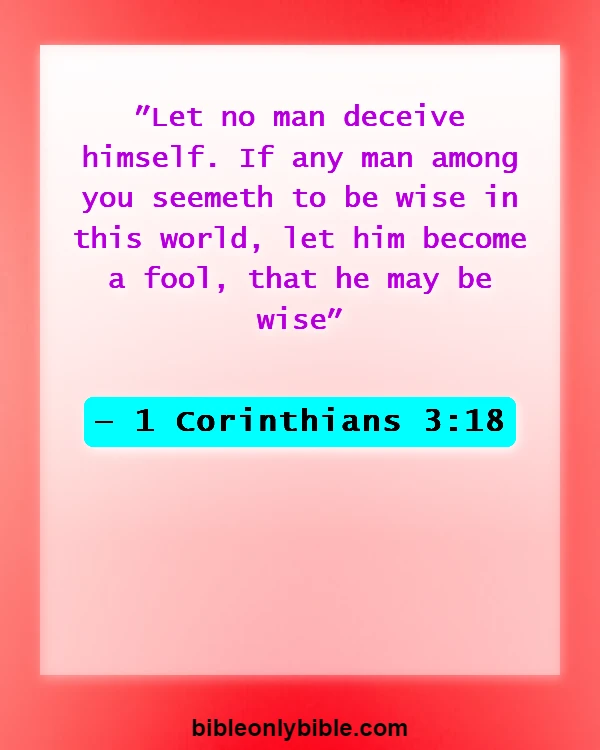
Let no man deceive himself. If any man among you seemeth to be wise in this world, let him become a fool, that he may be wise
1 Corinthians 3:18
Explanation:- This verse urges believers to recognize and reject the deception of worldly wisdom, which often masquerades as true insight. By humbling oneself and seeking divine wisdom, individuals can avoid the folly of self-deception and embrace genuine understanding and spiritual growth.
James 3:13 – Wisdom shows through good conduct and humility
Who is a wise man endued with knowledge among you? let him shew out of a good conversation his works with meekness of wisdom
James 3:13
Explanation:- This verse highlights the contrast between true wisdom and foolishness, emphasizing that genuine wisdom is demonstrated through good conduct and humility. It suggests that wise individuals are recognized not by their words, but by their actions and modest demeanor.
Matthew 25:2 – Five wise, five foolish; wisdom versus foolishness highlighted
Five of them were wise, five were foolish
Matthew 25:2
Explanation:- In this verse, the parable of the ten virgins illustrates the contrast between wisdom and foolishness. Five virgins are prepared with extra oil, symbolizing foresight and readiness, while the other five lack preparation, highlighting the consequences of neglecting wisdom in spiritual matters.
1 Corinthians 1:25 – God’s wisdom surpasses human wisdom and folly
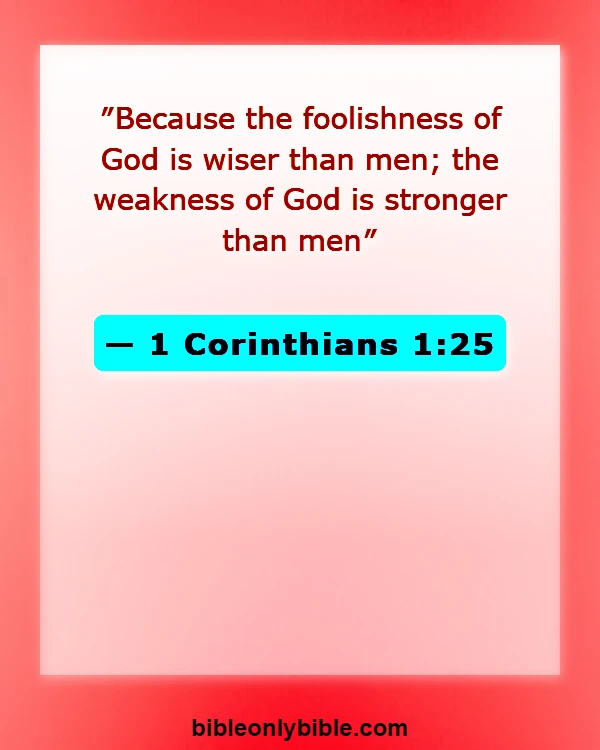
Because the foolishness of God is wiser than men; the weakness of God is stronger than men
1 Corinthians 1:25
Explanation:- This verse highlights the contrast between divine wisdom and human understanding. It suggests that even what seems foolish in God’s plan is wiser than human wisdom, and what appears weak is stronger than human strength. It calls us to trust in God’s superior wisdom.
What the Bible Says About Pride and Arrogance Leading to Stupidity
Pride and arrogance can often blind us, leading to foolish decisions and actions. The Bible addresses this head-on, teaching us the importance of humility and self-awareness. These verses serve as a gentle reminder to keep our hearts and minds open to growth and learning.
Proverbs 16:18 – Pride precedes destruction, arrogance leads to downfall

Pride goeth before destruction, an haughty spirit before a fall
Proverbs 16:18
Explanation:- Pride and arrogance often cloud judgment, making one susceptible to mistakes and poor decisions. This verse highlights how these traits can lead to one’s downfall, serving as a warning to cultivate humility and self-awareness to avoid the consequences of such destructive behavior.
Proverbs 11:2 – Pride leads to disgrace; wisdom comes with humility
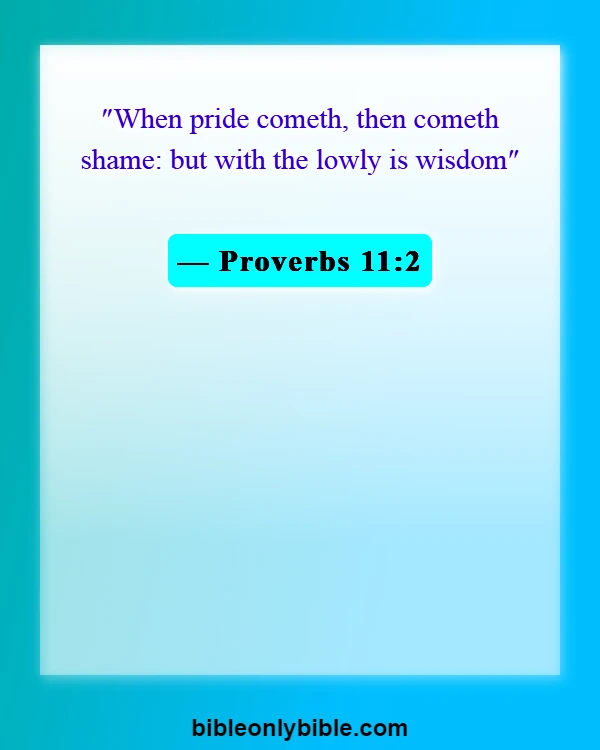
When pride cometh, then cometh shame: but with the lowly is wisdom
Proverbs 11:2
Explanation:- Pride and arrogance often cloud judgment, leading to poor decisions and disgrace. Embracing humility opens the path to wisdom, allowing one to learn and grow. By valuing humility, individuals can avoid the pitfalls of pride and make wiser, more thoughtful choices.
Isaiah 5:21 – Woe to the self-wise and prideful
Woe unto them that are wise in their own eyes, prudent in their own sight
Isaiah 5:21
Explanation:- This verse warns against pride and self-reliance, highlighting that those who consider themselves wise can fall into foolishness. It underscores the dangers of arrogance, suggesting that true wisdom involves humility and recognizing one’s limitations. Pride often blinds individuals to their own errors.
James 4:6 – God opposes the proud but gives grace to humble

But he giveth more grace. Wherefore he saith, God resisteth the proud, but giveth grace unto the humble
James 4:6
Explanation:- Pride and arrogance often lead to foolish decisions, distancing us from wisdom. In contrast, humility opens the door to God’s grace, offering guidance and understanding. Embracing humility aligns us with divine wisdom, helping us avoid the pitfalls of pride-induced stupidity.
Proverbs 26:12 – Self-conceit surpasses hope for a fool

Seest thou a man wise in his own conceit? there is more hope of a fool than of him
Proverbs 26:12
Explanation:- This verse highlights the danger of pride and arrogance, suggesting that a person who is self-conceited is less hopeful for improvement than a fool. It warns that pride blinds individuals to their own shortcomings, leading to greater folly.
Proverbs 27:1 – Do not boast about tomorrow’s certainty

Boast not thyself of to morrow; for thou knowest not what a day may bring forth
Proverbs 27:1
Explanation:- This verse warns against the arrogance of assuming control over the future. Pride in predicting tomorrow’s outcomes can lead to foolishness, as life is unpredictable. Embrace humility and recognize that only God knows what the future holds.
1 Corinthians 10:12 – Beware pride, it precedes a fall

Wherefore let him that thinketh he standeth take heed lest he fall
1 Corinthians 10:12
Explanation:- Pride can lead to overconfidence and a lack of awareness, making us vulnerable to mistakes and poor decisions. This verse warns us to stay humble and vigilant, recognizing our weaknesses to avoid falling into the trap of arrogance and its consequences.
